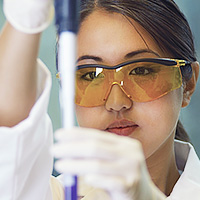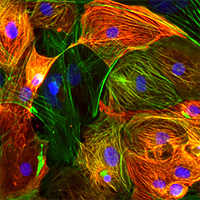- Cellartis Cardiomyocytes (from ChiPSC22) Kit (Cat. # Y10075)
- Cellartis Cardiomyocytes (from ChiPSC22)
- Cellartis CM Thawing Base
- Cellartis CM Culture Base
- Fetal Bovine Serum (FBS; Thermo Fisher Scientific, Cat. # 16140)
- Polyethylenimine (Sigma, Cat. # P3143)
- Na2B4O7/10H2O (Sigma, Cat. # S9640)
- Matrigel (Corning, Cat. # 356231)
- Fibronectin (Sigma-Aldrich, Cat. # F0895)
- Y-27632, MF (Wako Pure Chemical Industries, Ltd., Cat. # 257-00613)
- Trypsin-EDTA (0.25%), phenol red
- Ethanol (70%)
- PBS Dulbecco's with Ca2+ & Mg2+ (D-PBS +/+)
- PBS Dulbecco's w/o Ca2+ & Mg2+ (D-PBS –/–)
- General cell culture equipment used in cell culture laboratory
User-generated protocol
Cardiomyocytes on the MED64 MEA system
Cellartis cardiomyocytes are derived from human induced pluripotent stem cells and provide a promising, physiologically relevant, human model for preclinical testing and drug screening. Alpha MED Scientific's MED64 platform allows for noninvasive detection of electrophysiological parameters such as beat frequency and field potential duration (FPD). Cellartis cardiomyocytes used in combination with the MED64 platform demonstrate the potential to accurately predict cardiotoxic responses and to screen compound efficacy.
Materials required
Protocol
Cellartis cardiomyocytes, cryopreserved human pluripotent stem cell-derived cardiomyocytes, are initially thawed onto standard tissue culture plates coated with fibronectin. Cells can be plated onto the MED Probe starting three days after thawing. Recordings can be started two days after plating on the MED Probe.
Preparing the MED Probe
NOTE: Electrodes in the MED Probe are extremely fragile. Avoid contact with electrodes in all of the following procedures.
- Rinse an MED Probe with sterilized distilled water (SDW) at least three times. Fill the MED Probe with 70% ethanol and leave it for 30 min.
- Aspirate the ethanol in a sterile hood.
- Fill the MED Probe with 0.1% polyethylenimine (PEI) in 25 mM borate buffer (pH 8.4). Leave it at room temperature overnight. (Make sure the electrodes are covered by the PEI.)
- Aspirate the PEI and rinse the MED Probe with double distilled water (DDW) at least 4 times.
NOTE: PEI coating should be performed each time, before preparing the MED Probe (not just the first time).
- Place a dry MED Probe in a sterile 100-mm diameter culture dish.
- Place a sterile 35-mm diameter culture dish next to the MED Probe and fill the dish with sterile water to create a moist environment.
- Place a 7-μl bead of matrigel (diluted in DPBS +/+ to a final concentration of 200 μg/ml) over the recording electrode area on the MED Probe.
- Incubate the matrigel-coated MED Probe in a cell culture incubator at 37°C, with 5% CO2, for 3 hr.
NOTE: Do not let the matrigel-coated surface dry completely before seeding the cells.
Collecting from tissue culture plates
- Make MEA Plating Medium by adding 20% FBS to Cellartis CM Culture Base.
- Preheat an appropriate amount of Cellartis MEA Plating Medium to 37°C. Add Y-27632 to a final concentration of 5 μM prior to use.
- Aspirate the medium from each well containing cardiomyocytes.
- Rinse the wells with DPBS –/–.
- Add 0.25% trypsin/EDTA to each well (~80 μl/cm2) and incubate for 2–4 min.
- Gently detach the cells by dispensing the dissociation solution over the surface using a 1-ml pipettor.
- Add 1 volume (~ 80 μl/cm2) of the MEA Plating Medium (with 5 μM Y-27632) to each well to deactivate the trypsin.
- Transfer the cell suspension into a suitable tube.
- Count the cardiomyocytes.
- Centrifuge the cells at 200g for 5 min at room temperature.
- Aspirate the supernatant and gently resuspend the cell pellet in an appropriate volume of the MEA Plating Medium (with 5 μM Y-27632) to a final concentration of 6,000–7,000 viable cardiomyocytes/μl.
Plating onto the MED Probes
- Aspirate the matrigel from the MED Probe.
- Place a 7-μl bead of the cardiomyocyte suspension (corresponding to 42,000–49,000 viable cardiomyocytes) over the recording electrode area on the MED Probe.
NOTE: Do not let the matrigel-coated area dry completely before seeding the cells. If seeding Cellartis cardiomyocytes on several MED Probes, we recommended working on one probe at a time.
CAUTION: The MED Probe has four reference electrodes as well as 64 recording electrodes. The four reference electrodes MUST be free from cells (but covered by medium) for signal recording. - Incubate the MED Probe with the seeded Cellartis cardiomyocytes in a cell culture incubator at 37°C, with 5% CO2, for 2 hr, allowing the cells to adhere.
- Gently add 2 ml of the MEA Plating Medium (with 5 μM Y-27632) to the MED Probe, taking care not to dislodge the cells.
- Incubate in a cell culture incubator at 37°C, with 5% CO2.
- After 24–48 hours, change the medium to Cellartis CM Culture Base + 10% FBS. After this first medium exchange, half-volume medium changes should be performed every two to three days, depending on appearance/pH. Recordings can be started one day after the change to Cellartis CM Culture Base (cardiomyocytes should have started to beat at this point) in the standard assay medium of choice (Cellartis CM Culture Base can be used).
Related Products

User-generated protocols
User-generated protocols are based on internal proof-of-concept experiments, customer collaborations, and published literature. In some cases, relevant results are discussed in our research news BioView blog articles. While we expect these protocols to be successful in your hands, they may not be fully reviewed or optimized. We encourage you to contact us or refer to the published literature for more information about these user-generated and -reported protocols.
If you are looking for a product-specific, fully optimized User Manual or Protocol-At-A-Glance, please visit the product's product page, open the item's product details row in the price table, and click Documents. More detailed instructions for locating documents are available on our website FAQs page.
Questions? Protocols of your own that you would like to share?
Contact technical support Give feedbackCellartis hPS cell-derived cardiomyocytes citation list
Publications using Cellartis human pluripotent stem cell-derived cardiomyocytes.
Takara Bio USA, Inc.
United States/Canada: +1.800.662.2566 • Asia Pacific: +1.650.919.7300 • Europe: +33.(0)1.3904.6880 • Japan: +81.(0)77.565.6999
FOR RESEARCH USE ONLY. NOT FOR USE IN DIAGNOSTIC PROCEDURES. © 2025 Takara Bio Inc. All Rights Reserved. All trademarks are the property of Takara Bio Inc. or its affiliate(s) in the U.S. and/or other countries or their respective owners. Certain trademarks may not be registered in all jurisdictions. Additional product, intellectual property, and restricted use information is available at takarabio.com.




